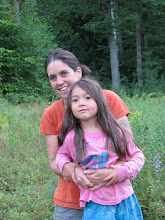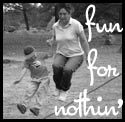
Equinox is approaching......The seasonal festivals are one of the other elements of Waldorf Education that drew me in, I have already written about the Nature tables. As an herbalist I always liked to celebrate the seasona changes.......and the wheel of the year; Summer Solstice (June 21) Fall Equinox (Sept 21) Winter Solstice (Dec 21) and Spring Equinox (March 20) as well as the cross festivals Beltane, Samhain, Lughnasadh (Lammas), and Brigits Day ( Imbolc)...more about these as they are upon us.
On our Nature walks recently we have been talking about signs of seasonal changes and trying to experience them with all our senses......we have been noticing different colours and talking about the colours of the season. The season is definately late summer.......Cool nights, crisp mornings, Goldrenrod in full bloom, Sun coming in at a different angle, luscious watermelons......apples and peaches galore.....
I am teaching this weekend at the Green Nations Gathering held close by at Rowe Camp and Conference Center. On Saturday night as part of the Conference there is going to be an Equinox Fire Celebration.......Zoe wanting to have a campfire for her birthday (not until Oct) so we are planning to participate in the fire circle.
We recenty got this great book.. Dragon Baked Bread by Warren Lee Cohen
"
This is a tale of bravery and bread
One of delight, of daring and dread
In which I befriend our dear Princess Alice
And help her to save this wonderful palace."
On the day of the Fall Harvest Feast, the baker’s old cart collapses and falls into the moat, turning his flour and yeast into a doughy mess. How is the royal feast to be saved? The King calls on his advisers to solve the problem, but only the young Princess Alice has a solution. To the astonishment of those gathered round, she proposes to call on the dragon to bake the bread dough with its flaming roar.
Waldorf schools celebrate the four seasonal festivals of Michaelmas (fall), Christmas (winter), Easter (spring), and St. John (summer). For Michaelmas, (September 29) St. Michael is known as the conqueror of the dragon, the heavenly hero with his starry sword who gives strength to people. I am just beginning to "understand" a little about Michaelmas. I am still a little uncomfortable with the Christian Saints. I expect that this will take some time to work out. I did finally found a story through one of the waldorf list groups that I will work with as an intro to Michaelmas. It is called "the Star Children" and is by by Corinne Batzell, Ann Arbor, Michigan
What are you all doing with your children to celebrate. I am always looking for ways to create new traditions and rituals to stregthen our little family!
Celebrating festivals is one of the largest pieces of Waldorf education, building a community in which to celebrate these festivals! Festivals give us a moment to pause within our busy lives and just breathe. The festivals of autumn and early winter are the times when we begin to gather the light to help us to make it through the long winter nights. Winter pulls us further inward, back to Self and introspection. Outwardly all is still, but beneath the surface much stirs, Winter time is also for guarding the light of humanity and community for rebirth in the spring.
Why celebrate? Ceremony is a way of communicating with our deepest selves, the Great Spirit, Mother Earth, and all who came before. It is a way of saying thank you, a way of showing respect for the changing seasons, respect for the moon cycles, respect for all life and all beings. Ceremony is a way of acknowledging the sacredness of all that is, and it gives us an opportunity to feel and to remember the sacredness of every moment. Ceremony is a way to help us reconnect to the ancient rhythm- the heartbeat of our grandmothers. In cultures where there is a strong tradition of ritual and ceremony, where they are honored and regularly practiced, there is an emphasis on being in the world rather than doing tasks or accomplishing things. The emphasis is on the process of deepening rather than producing or achieving.









No comments:
Post a Comment